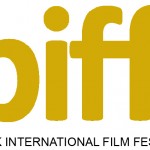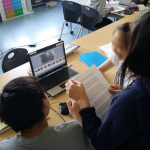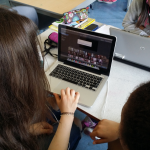How do we use technology to integrate students with special needs, with students in the regular classroom, in a way that demystifies the stigma associated with special education, and creates an inclusive learning environment?
Strategy:
Developed strategies and resources for using information and communication technologies for cross-curricular integrated units focused around social justice.
1. Used multimedia platforms to convey meaning and understanding (visual literacy):
- film studies
- illustration and design
- photography
2. Collaborative-inquiry through STEM
Goals:
- created a communications and media lab including video and design hardware and software
- increased our own knowledge and skills in using the equipment to train and disseminate the use of technology throughout the school for media and STEM projects
- created a truly inclusive learning environment by successfully following a Universal Design for Learning framework for integrating special education students with students in the regular class
- used STEM projects and technology to create dynamic multimedia learning opportunities for students
Rationale:
For the past two years, we have been working with the Toronto International Film Festival (tiff.) to put on our own film festival at our school called the Brock International Film Festival (biff.) The students are required to create their own documentaries and short films based on various topics and themes, integrated across multiple subject areas. Through the process of filmmaking, we have seen how successful and talented our special education students are when given the opportunity to express their creativity and knowledge through visual literacy mediums. The success they find through this initiative breeds acceptance from their peers and helps to build their self-esteem. The use of technology and media allows all of the students in our school to access their different learning styles and accommodate their needs.
Team Members
Alan Malolos
Toronto District School Board
Vishavdev Basanti
Toronto District School Board
Professional Learning Goals
- build a skill base, knowledge and confidence in using the latest technologies to facilitate inclusion for all types of learners
- learn how to use technology to build an empowering learning environment that encourages students to take risks with their learning
- train teachers at our school on how to effectively use current technologies to create an inclusive classroom and school culture
- become comfortable with a variety of technologies in order to implement into units and to provide students with options and choice
Activities and Resources
We were able to attend several workshops related to film and media production:
- tiff. film-in-a-day workshop
- tiff. documentary-in-a-day workshop
- Docs for Schools Teacher Conference at Ryerson University
- Digital Arts workshop at George Brown College
We were able to build a partial film and media production suite with the two camcorders, two boom mics, and a Macbook and PC notebook for video/photo editing.
We were able to participate in the Adobe Youth Voices project through Free the Children due to having the resources mentioned above.
Our students created their own documentary and dramatic films for our own Brock International Film Festival (June 18).
Unexpected Challenges
Some unexpected challenges:
- booking and scheduling time with industry experts to assist with workshops and training for our TLC team and students was extremely challenging (we had several people cancel on us or were not available)
- in one case, we missed a day workshop we had planned to attend due to the agency contact not replying to our emails
- trying to learn various technologies in a timely manner in order to support students (the learning curve was steep in some situations)
Enhancing Student Learning and Development
A key goal for our project was to give our special needs students an opportunity to achieve success and showcase their skills and talents in collaborative projects that went beyond a heavy emphasis on reading and paper/pencil task. We recognized emphasizing those types of tasks isn’t equitable to our students with special needs, which leads to stigma, anxiety and low self-esteem with these students. Framing our term around a large collaborative project such as filmmaking, we were able to give our students with special needs an opportunity to express their creativity, knowledge and skills, through a medium that put them on a level playing field with all of their peers. Since the majority of students are at a beginner level with media and digital arts in grades 7 and 8, and the medium emphasizes visual literacy and technology, all students were able to access their talents through differentiating their roles within their groups to work towards their strengths. Introducing all our students to technology and filmmaking has provided them with another “tool” to use to showcase their learning as they transition to high school.
As teachers, in order to achieve our goals to make this film project successful, we had to be able to increase our own expertise in media production and digital arts to teach our own students these skills. Participating in this TLC project, gave us the resources and opportunities for PD we needed to be successful in their filmmaking project, and create an integrated delivery model for special education.
Sharing
Throughout the year while working on our project, we’ve generated a high level of interest from not just educators at our school, but we now have teachers, administrators and central instructional leaders from secondary schools and other elementary schools in our area asking to attend our film festival and to collaborate with our students. Our plan is to showcase our students’ work at our film festival on June 18 to all of the students and educators in attendance and then host our own PD sessions in the future for all of those who are interested in either joining our film festival next year, or by doing their own filmmaking projects.
Project Evaluation
Having a chance to reflect on our process and preparing for our film festival, we believe that we have met the goals we set for ourselves and deem this experience a success. We have become better acquainted with using Adobe software on a PC and iMovie on a Mac. We were able to learn how to use digital cameras, boom mics, iPads and iPhones to record film. By learning how to use these tools, we were able to collaborate and create an inclusive learning environment that benefitted all types of learners.
Being able to create small activities and bringing in professionals to facilitate workshops helped us to model the power of collaboration and taking risk in our own learning. Showing our students that we were also learning from others and were not afraid to admit we did not know something, encouraged them to have a voice in their learning and to take risks with the variety of tasks we had designed for them. Students were able to experiment with still photography, documentary filmmaking, script writing, character creation, editing, acting, producing and creating sound. In each of these scenarios, students were able to collaborate with others and to work on their own. As we progressed from task to task, students became more comfortable with voicing their ideas and opinions, and were comfortable taking risks. Students were engaged and reflective through this process. Students were given options and choice with the type of technology they wanted to use and it really showcased their strengths with their final submissions.
Some challenges we faced in this process was not being able to connect as much as we would have liked with people in the industry. There were a few cases where people did not follow through and we were forced to learn on our own. In hindsight, this turned out to be a blessing because it forced us to research and take risks ourselves in our learning. Often we would collaborate with the students and try to figure out how to use certain software or brainstorm solutions with our students when faced with situational problems.
We know our TLC has been a success because we both can see how far we have come since we started this process. The fears and unknowns of using certain technology are no longer there. We don’t need to rely on others to solve our technology issues or answer our questions. We both feel comfortable with the different tools we have implemented and know what resources to access when we are faced with a challenge. Most of all, the high student engagement we saw in our students tells us that we were successful. The students were engaged, empowered and able to share their expertise with us throughout this process. We are excited to celebrate our learning as a group at our film festival, biff. We are also looking forward to sharing our learning with our colleagues in order to help them implement technology into their pedagogy.
Resources Used
Hot Docs: Docs for Schools Teacher Conference
http://www.hotdocs.ca/youth/docs_for_schools_teacher_conference/
Toronto International Film Festival: Film in a Day Workshop
Toronto International Film Festival: Doc in a Day Workshop
Adobe Youth Voices through Free the Children
Hot Docs: Looking at Documentaries resource pack
http://www.hotdocs.ca/resources/documents/educational/HD_DocLib_EducPkg_LOOKINGDOCS.pdf
Resources Created
These resources will open in your browser in a new tab, or be downloaded to your computer.





